Australian florin coins by the years
1909
Mint: London
Mint mark: None
Mintage: 1
156 rim denticles on reverse. Legend has flat-base lettering.
The die for this coin was prepared by the Royal Mint and one uniface trial piece was struck. The trial piece and the die are still in the possession of the Royal Mint. From the trial specimen two electrotypes were made, one for the Royal Australian Mint and one for the New South Wales Museum of Applied Science (now the Powerhouse Museum). One of those electrotypes was stolen from the Museum of Applied Science by David Gee in about 1970 and used to make a die. Later, Gee was able to steal a Sydney Mint Edward VII Ј2 obverse die from the Dixson Collection held by the NSW State Library and alter it to form an obverse for two double-sided counterfeit 1909 florins. The item pictured below is not one of those, it is a cast, possibly used as a substitute for the stolen electrotype.
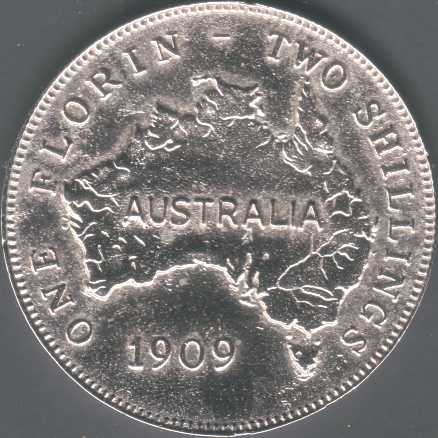
Between the time he procured the electrotype and when he was able to acquire the Ј2 obverse, Gee struck a uniface trial piece.
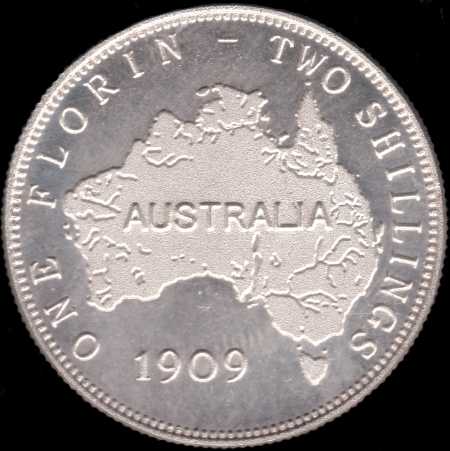
Counterfeit uniface trial struck on a thin planchet.
According to Gee, the die made from the stolen electrotype wasn't good enough
so he had it retooled (touched up) before this piece was struck.
In 2005 the Perth Mint struck a dollar-sized replica of the 1909 pattern for the Cook Islands.
A collector's set produced in 2008 included that coin along with a similarly sized replica of the
1910 florin and "actual size" replicas with obverses. The latter coins are in base metal and
are slightly smaller than the coins they represent (diameter 28 mm instead of 28.5 mm).
1910
Mint: London
Mint mark: None
Diameter:
28.5mm (1 1/8")
Weight:
11.31g (0.4 oz)
Composition:
92.5% Ag, 7.5% Cu
Mintage:
1,250,000
166 rim denticles on reverse.
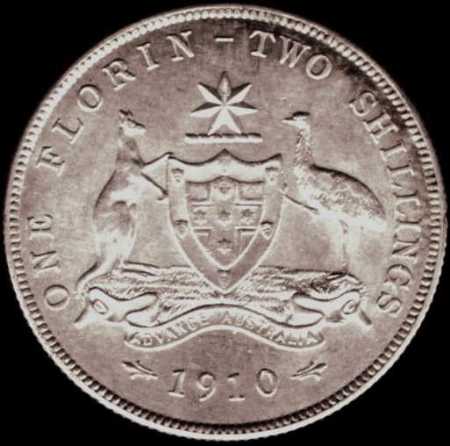
1911
Mint: London
Mint mark: None
Mintage: 907,870
166 rim denticles on reverse. Legend has flat-base lettering.
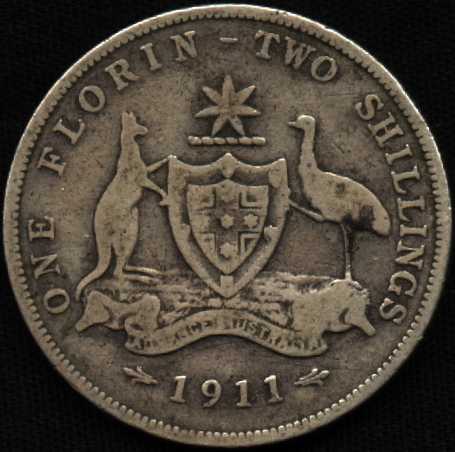
1912
Mint: London
Mint mark: None
Mintage: 1,292,130
166 rim denticles on reverse. Legend has flat-base lettering.
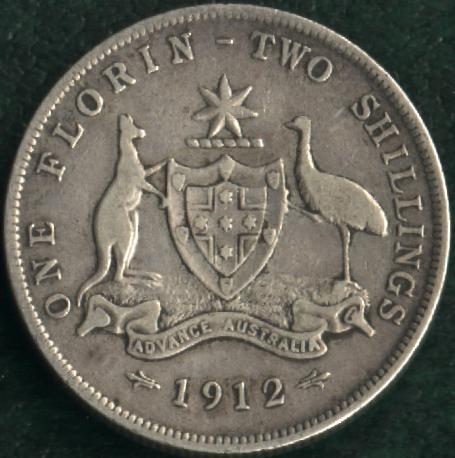
1913
Mint: London
Mint mark: None
Mintage: 1,200,000
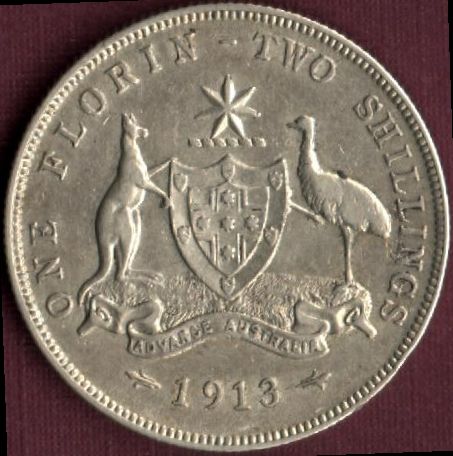
1914
Mint: London
Mint mark: None
Mintage:
2,300,000
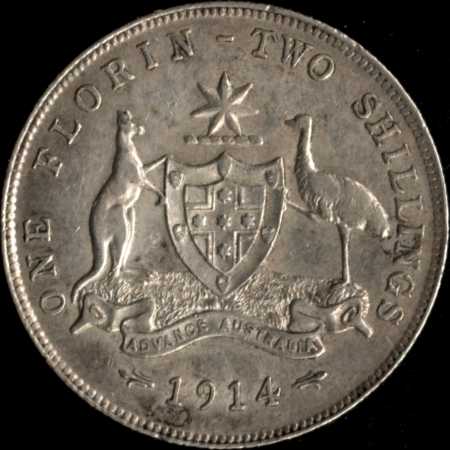
Mint:
Birmingham
Mint mark:
H below date
Mintage:
500,000
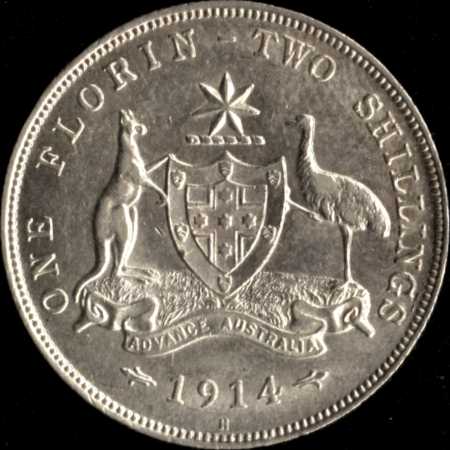
1915
Mint:
Royal Mint, London
Mint mark: None
Mintage:
500,000
Mint:
Heaton & Sons, Birmingham
Mint mark:
H under date
Mintage:
500,000
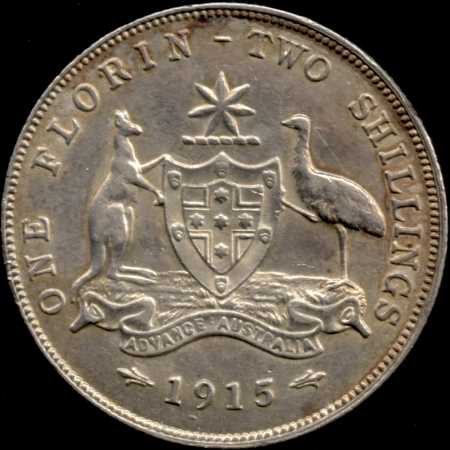
1916
Mint: Melbourne
Mint mark: M below date
Mintage: 2,752,000
1917
Mint: Melbourne
Mint mark: M below date
Mintage: 4,305,358
1918
Mint: Melbourne
Mint mark: M below date
Mintage: 2,094,830
1919
Mint:
Melbourne
Mint mark:
M on reverse below date
Mintage: 1,667,332
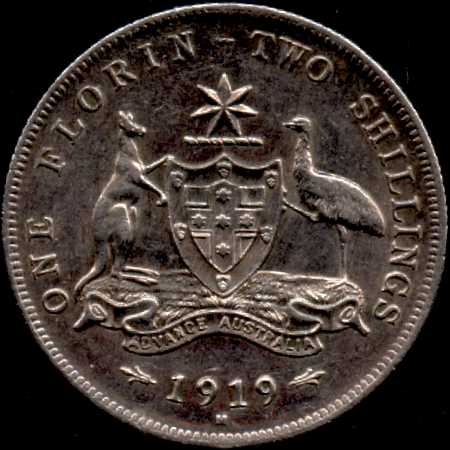
1921
Mint: Melbourne
Mint mark:
None
Mintage:
1,247,112
1922
Mint: Melbourne
Mint mark:
None
Mintage:
2.057,858
1923
Mint: Melbourne
Mint mark:
None
Mintage:
1,038,464
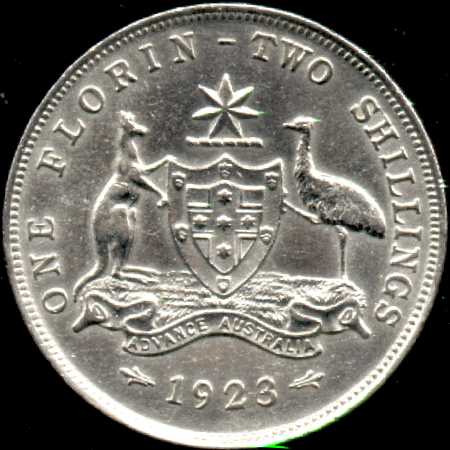
1924
1924, 1925 and 1926 were the only years in which florins were struck at the Sydney mint. Dies were supplied from Melbourne and there is no way to distinguish the coins from each mint.
Mint: Melbourne
Mint mark:
None
Mintage:
953,000
Mint:
Sydney
Mint mark:
None
Mintage:
630,000
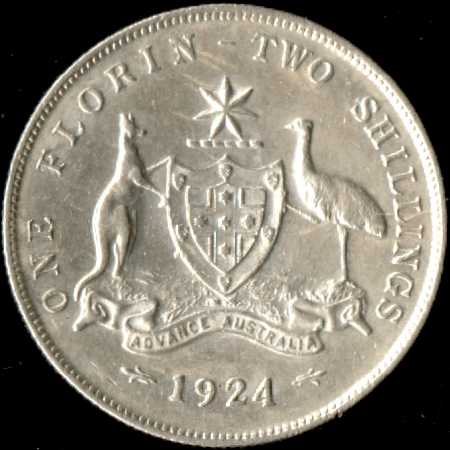
1925
Mint: Melbourne
Mint mark:
None
Mintage:
2,316,000
Mint:
Sydney
Mint mark:
None
Mintage:
644,000
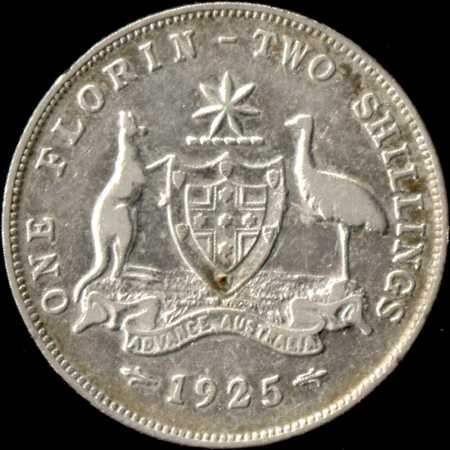
1926
Mint: Melbourne
Mint mark:
None
Mintage:
2,072,250
Mint:
Sydney
Mint mark:
None
Mintage:
415,000
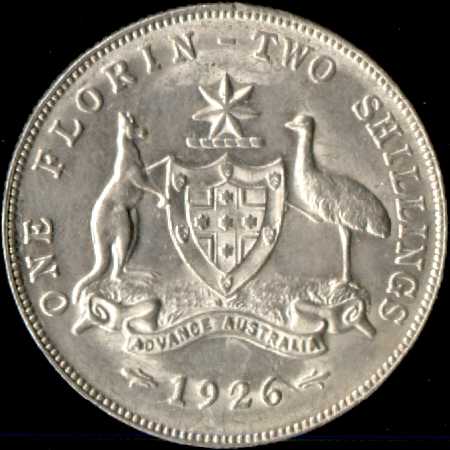
1927
Standard
Mint: Melbourne
Mint mark:
None
Mintage:
1,420,970
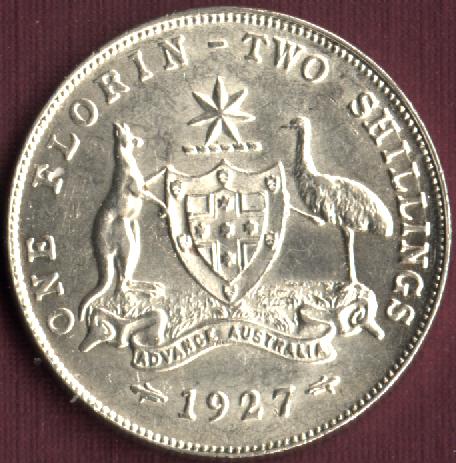
Commemorative
Mint:
Sydney
Mint mark:
None
Mintage:
2,000,000
A condition of federation imposed by Victorian negotiators was that the national parliament should not be within 200 miles of Sydney. Eventually a site was chosen alongside the Molonglo river (a bit closer to Sydney than specified by the original agreement) and an area of rural New South Wales was set aside as federal territory. Twenty-seven years after federation, the temporary Federal Parliament House in Canberra was ready for occupation and to commemorate this occasion, a special florin was struck depicting the building. The quality of the so-called Canberra Florin was very high. The design was very distinctive and many were put aside as souvenirs. Moreover, there were more commemorative florins than standard issue florins struck in 1927. The result is that high-grade Canberra florins are fairly common whereas the standard issue coins are scarce in grades EF and above.
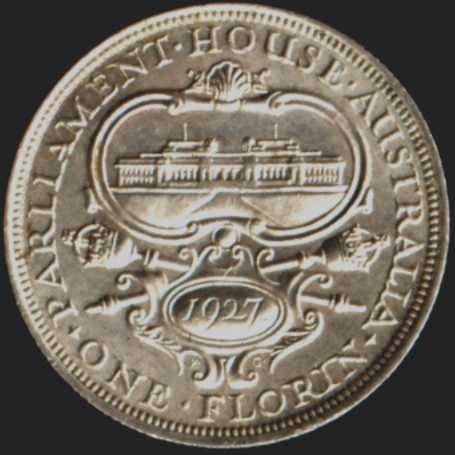
1928
Mint: Melbourne
Mint mark:
None
Mintage:
1,962,000
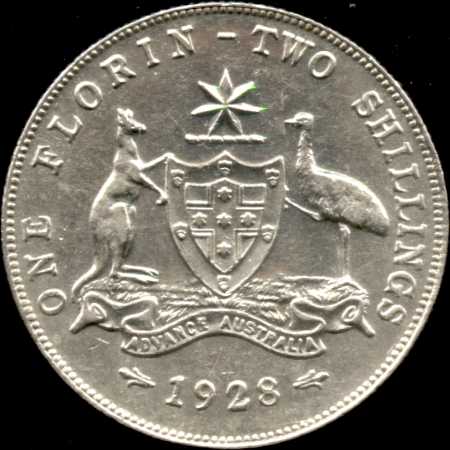
1931
Mint: Melbourne
Mint mark:
None
Mintage:
3,129,682
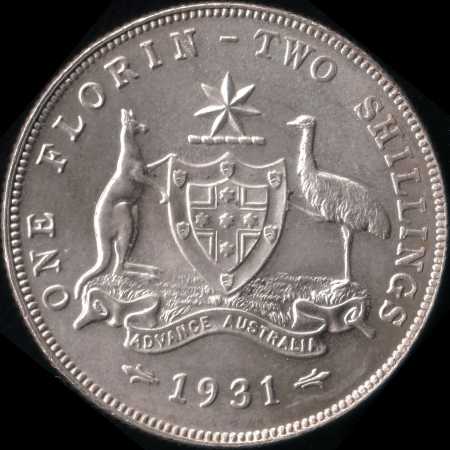
1932
Mint: Melbourne
Mint mark:
None
Mintage: 188,000
1933
Mint: Melbourne
Mint mark:
None
Mintage: 488,000
1934
Mint: Melbourne
Mint mark:
None
Mintage: 1,674,000
1935
Standard
Mint: Melbourne
Mint mark:
None
Mintage: 915,000
Despite its low mintage, this coin (i.e. the standard one) is fairly easy to obtain.
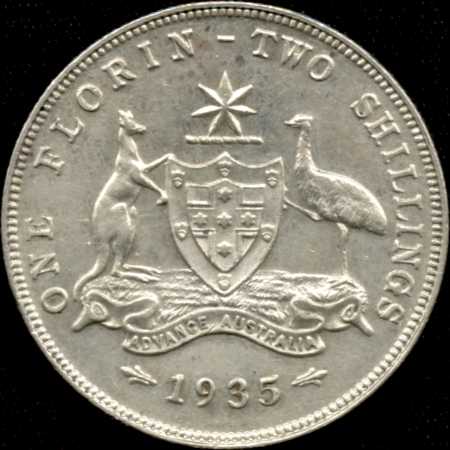
Commemorative
Mint: Melbourne
Mint mark:
None
Mintage: 54,000
The commemorative florin issued in 1935 to mark the centenary of Melbourne was
the first Australian mint product to sold at a premium over its face value. 75,000
of these coins were struck and were offered for 3/- each. In the aftermath of the
Great Depression, the idea of paying 3/- for a 2/- coin did not sit well with Australian
people and 21,000 of these coins were later melted down, leaving just 54,000 in
circulation.
Although the Melbourne Centenary florin is a very scarce coin, its very distinctive design and premium price made it highly collectible and many were set aside and or were pulled from circulation very early. In addition, the Melbourne retail shop, Foy and Gibson, gave away a florin with every suit it sold in 1935. It also gave away florins in change at face value to its customers. The collectability of the coin meant that many were never circulated; of the several thousand specimens in existence many are of very high grade. Mint rolls are known to have existed at least until 1999. The result of all this is that the price of very high-grade Melbourne Centenary florins is actually lower than the price of the standard issue coin in similar condition.
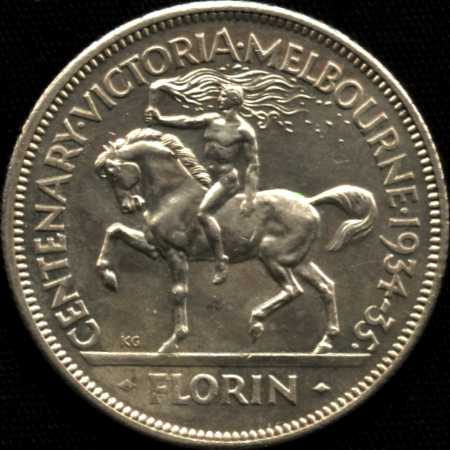
1936
Mint: Melbourne
Mint mark:
None
Mintage:
5,054,000
On the basis of official mintage figures, the 1936 florin is by far the most common of the George V series. Its closest rival is the 1931 issue. The high mintage together with being the youngest coin of the series means that even now specimens in high grade are relatively inexpensive.
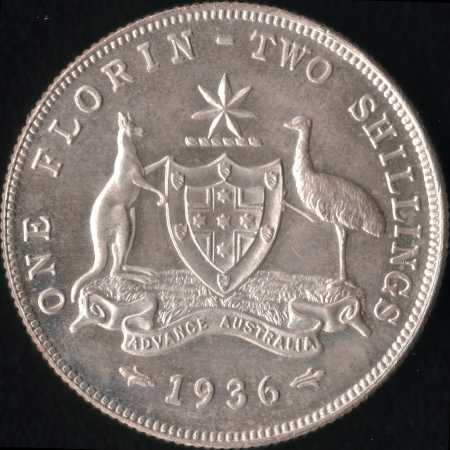
1938
Mint: Melbourne
Mint mark:
None
Mintage: 2,990,000
1938 saw a change in both obverse and reverse designs on the florins. The obverse
carried the uncrowned head of King George VI and represented something of a break
from tradition which had that "colonial" coinage should show the crowned
head of the reigning monarch.
The reverse design was a fine example of clutter.
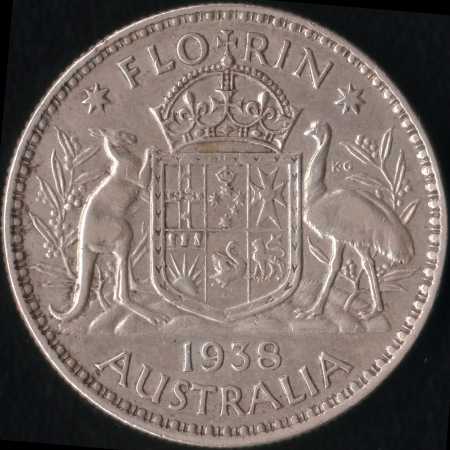
1939
Mint: Melbourne
Mint mark:
None
Mintage: 630,000
The low mintage of the 1939 coin, together with it being the second of a series, means that the coin is quite rare in high grades.
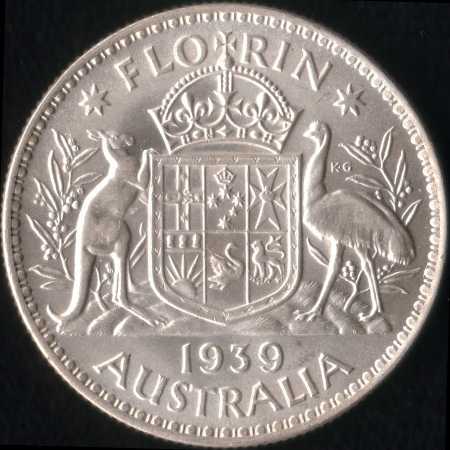
1940
Mint: Melbourne
Mint mark:
None
Mintage: 8,410,000
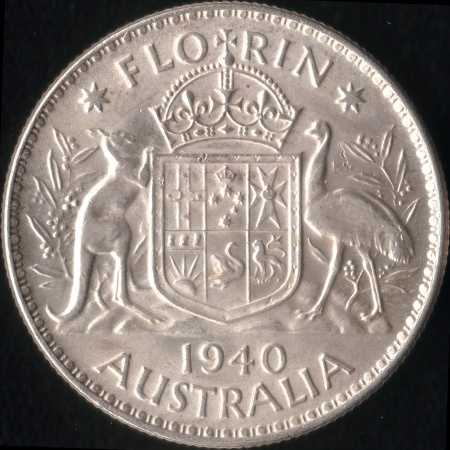
1941
Mint: Melbourne
Mint mark:
None
Mintage: 7,694,000
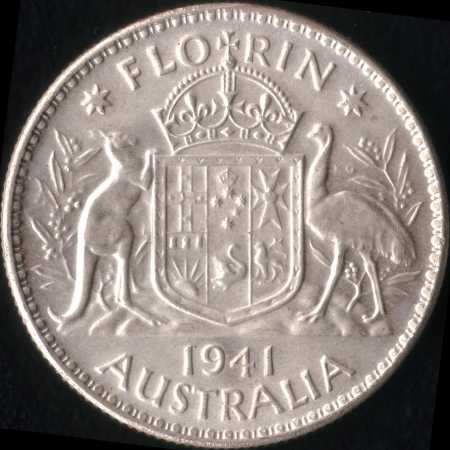
1942
Mint: Melbourne
Mint mark:
None
Mintage: 18,070,000
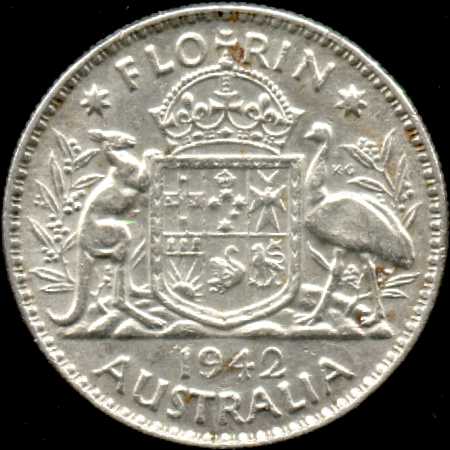
Mint: U.S. Mint, San Francisco
Mint mark: S above date
Mintage: 6,000,000
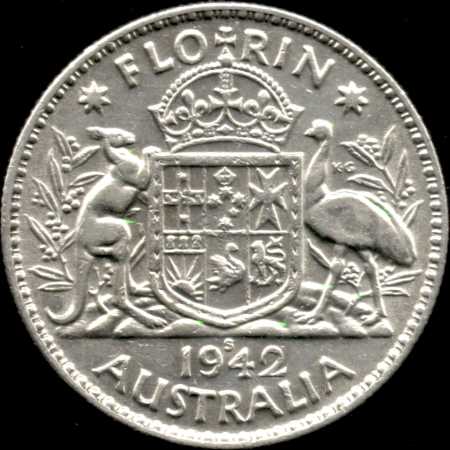
1943
Mint: Melbourne
Mint mark:
None
Mintage:
12,562,000
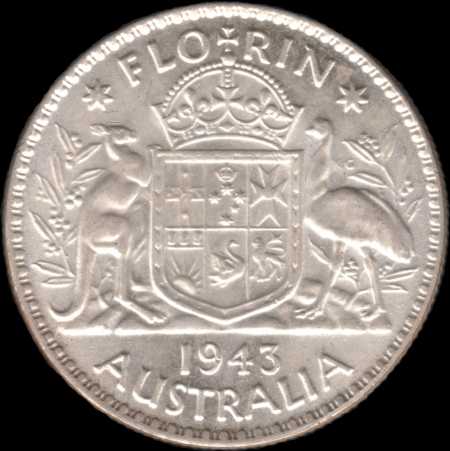
Mint: U.S. Mint, San Francisco
Mint mark: S above date
Mintage:
11,000,000
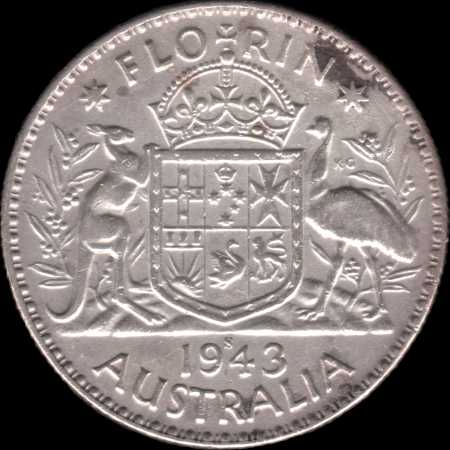
1944
Mint: Melbourne
Mint mark:
None
Mintage:
22,440,000
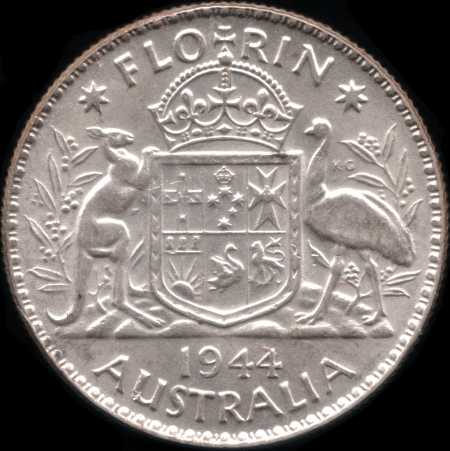
Mint: U.S. Mint, San Francisco
Mint mark: S above date
Mintage:
11,000,000
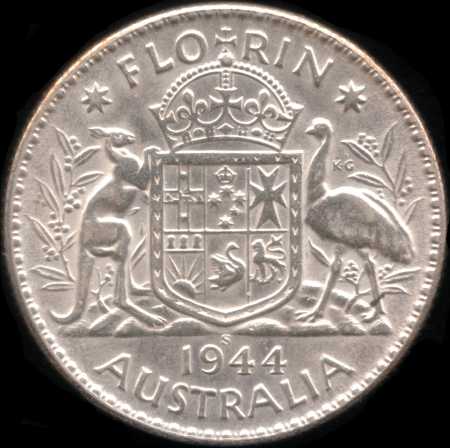
1945
Mint: Melbourne
Mint mark:
None
Mintage:
14,874,000
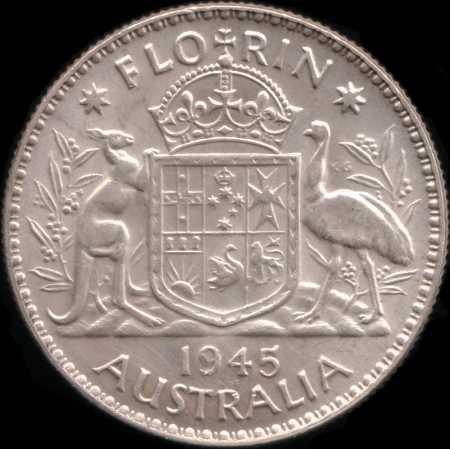
1946
Mint: Melbourne
Mint mark:
None
Mintage:
23,222,000
1946 saw a reduction in the silver content of Australian coins. This and subsequent florins were 50% silver, 40% copper, 5% zinc and 5% nickel.
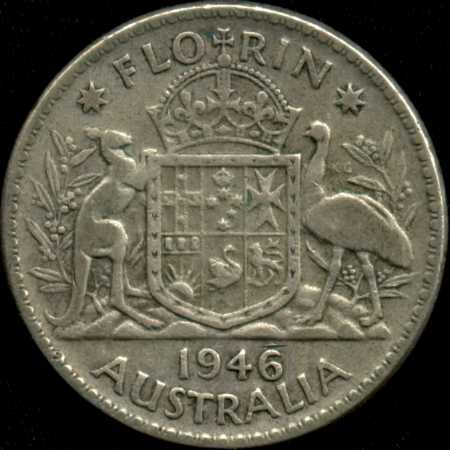
1953
Composition:
50%Ag, 40%Cu,
5%Ni, 5%Zn
Mint: Melbourne
Mint mark:
None
Mintage:
13,466,000
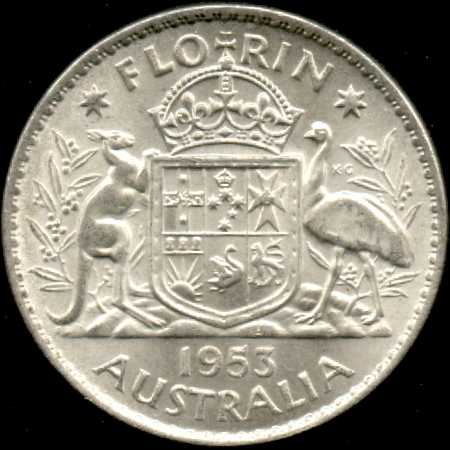
Other Australian coins
Elizabeth II coins (1952-2022)

